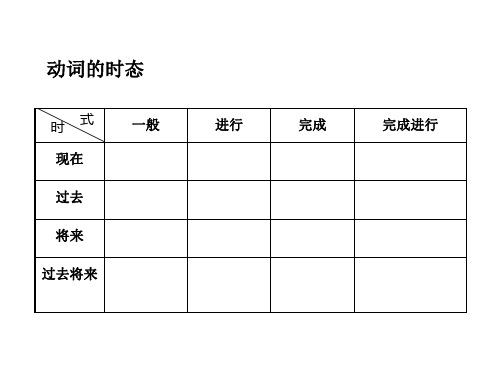英语语法课件
合集下载
英语语法基础知识 ppt课件

Inflectional(‘s)
构词法
词(word) 句法功能
简单词(Simple ) 派生词(Derivative) 复合词 (Compound)
功能词(Function) 实义祠(Content)
分句类型(Types of clauses)
Independent (main; min S+V, complete) 独立分句 ( 主干, 主谓齐全,完整) I love linguistics. You believe me.
复合句:两个或两个以上的主谓结构,其中
一个(或多个)主谓结构充当句子的某一(些)成分,如: 主语、宾语、表语、定语、状语、同位语。 从属连词、连接代词、连接副词
This is an interesting book. This is the book which they talked about.
并列句Compound (2> independent clauses connected with co-ordinating conjunctions: 并列连词)
She read the book but she didn’t like it。
复合句Complex (a combination of dependent (subordinate) and independent clauses:从属连词、连接代词、连接副词)
并列句:两个或两个以上互相独立的主谓结
构、由并列连词连接。
Oliver came to the party, but Rose did not. Every room in the house has its own
function and it is difficult to imagine the life without one of them.
初中英语语法—形容词、副词 PPT课件 图文

A. correct B. correctly C. correctness D. correcting
5. They watched a movie and felt quite __A___ .
A. sad B. sadly C. sadness D. sady
形容词作宾语补 足语
某些动词如make,paint,keep,find, like,want等后接名词或代词作宾语,再接 形容词作宾语补足语,补充说明宾语的状态、 特征等。形容词和宾语一起构成复合宾 语.有的已构成固定词组。
an old big brown wooden box 一个旧而大的棕色木箱子 two tall young Japanese girls 两位高个、年轻的日本姑娘
例题
1) Tony is going camping with ___ boys. A. little two other B. two little other C. two other little D. little other two
1.He is a good student. 2. She is a beautiful girl. 3. I have a clever pet dog.
2)多个形容词做定语时的排列顺序:
口诀: 冠代数形大,新色国材名
注释: 冠----冠词;代----代词;数----数词;形----形状、 性质;大----大小、长短;新----新旧;色----颜色; 国----国家、产地;材----材料、用途;名-----名词
The windows of our classroom are cleaner than those of theirs.
形容词原级的常用句
5. They watched a movie and felt quite __A___ .
A. sad B. sadly C. sadness D. sady
形容词作宾语补 足语
某些动词如make,paint,keep,find, like,want等后接名词或代词作宾语,再接 形容词作宾语补足语,补充说明宾语的状态、 特征等。形容词和宾语一起构成复合宾 语.有的已构成固定词组。
an old big brown wooden box 一个旧而大的棕色木箱子 two tall young Japanese girls 两位高个、年轻的日本姑娘
例题
1) Tony is going camping with ___ boys. A. little two other B. two little other C. two other little D. little other two
1.He is a good student. 2. She is a beautiful girl. 3. I have a clever pet dog.
2)多个形容词做定语时的排列顺序:
口诀: 冠代数形大,新色国材名
注释: 冠----冠词;代----代词;数----数词;形----形状、 性质;大----大小、长短;新----新旧;色----颜色; 国----国家、产地;材----材料、用途;名-----名词
The windows of our classroom are cleaner than those of theirs.
形容词原级的常用句
英语语法讲解课件-状语从句 ppt课件

ppt课件 10
ppt课件
11
状语从句分类
1. 2. 3. 4. 5. 6. 7. 8. 表示时间 表示地点 表示原因 表示结果 表示目的 表示条件 表示让步 表示比较
ppt课件 12
表示时间
一、时间状语从句 • When, as ,while, • before, after, • till, Until, • as soon as, • The moment, the minute, the first time…. (名词性短语)
ppt课件 21
E.G. 1. He was so angry that he left the room without a word. 他很生气,一句话不说就离开 了房间。 2. It is such a heavy box that nobody can move it. 3. The box is so heavy that nobody can move it. 4. The box is so heavy as nobody can move . 5. I didn’t go early, so that I didn’t get a seat.
ppt课件
30
表示比较
八、比较状语从句
主要由 • than, • as...as, • the more…the more • 这类从句常常有一些成分没有表示出来:
ppt课件 31
E.G.
• The more you eat, the fatter you are. • John is less clever than Tom. • He is not so/as clever as his brother.
ppt课件
ppt课件
11
状语从句分类
1. 2. 3. 4. 5. 6. 7. 8. 表示时间 表示地点 表示原因 表示结果 表示目的 表示条件 表示让步 表示比较
ppt课件 12
表示时间
一、时间状语从句 • When, as ,while, • before, after, • till, Until, • as soon as, • The moment, the minute, the first time…. (名词性短语)
ppt课件 21
E.G. 1. He was so angry that he left the room without a word. 他很生气,一句话不说就离开 了房间。 2. It is such a heavy box that nobody can move it. 3. The box is so heavy that nobody can move it. 4. The box is so heavy as nobody can move . 5. I didn’t go early, so that I didn’t get a seat.
ppt课件
30
表示比较
八、比较状语从句
主要由 • than, • as...as, • the more…the more • 这类从句常常有一些成分没有表示出来:
ppt课件 31
E.G.
• The more you eat, the fatter you are. • John is less clever than Tom. • He is not so/as clever as his brother.
ppt课件
高中英语语法 非谓语动词 动名词的用法课件(共58张PPT)

2) I’ll remember to post the letter. 我会记着去寄信的。
3) I shall never forget seeing the famous writer. 我__永__远___不__会__忘__记__见__到__过__那__位__著__名__ 作__家__。_
4) Don’t forget to write to your mother. 不__要__忘__了__给__你__母__亲__写__信__。_
E. go on doing 和 go on to do go on doing 继续做一直在做的事; go on to do 接着做另一件事。如:
1) 请接着做这同一个练习。
P__le_a_s_e_g_o__o_n_d_o_i_n_g_ the same exercise. 2) 请做另外一个练习。 P_l_e_a_s_e_g_o_o_n__t_o_d_o_ the other exercise.
一般式 完成式
主动形式 doing
having done
被动形式 being done having been done
一. 作主语 动名词作主语时,句子有三种形式:
①动名词直接置于句首主语的位置上。 1) 捉弄别人是我们万万不能干的.
_P_la_y_i_n_g_t_r_i_ck__s_o_n_o_t_h_e_r_s_ is something we should never do. 2) 学习新单词对我来说非常重要。
_it_i_s_p_l_e_a_sa_n__t _w_o_r___w_i_t_h_y_o_u_._____
③ 在there be结构中作主语,这种结 构的意思相当于“It is impossible to do… ” 如:
3) I shall never forget seeing the famous writer. 我__永__远___不__会__忘__记__见__到__过__那__位__著__名__ 作__家__。_
4) Don’t forget to write to your mother. 不__要__忘__了__给__你__母__亲__写__信__。_
E. go on doing 和 go on to do go on doing 继续做一直在做的事; go on to do 接着做另一件事。如:
1) 请接着做这同一个练习。
P__le_a_s_e_g_o__o_n_d_o_i_n_g_ the same exercise. 2) 请做另外一个练习。 P_l_e_a_s_e_g_o_o_n__t_o_d_o_ the other exercise.
一般式 完成式
主动形式 doing
having done
被动形式 being done having been done
一. 作主语 动名词作主语时,句子有三种形式:
①动名词直接置于句首主语的位置上。 1) 捉弄别人是我们万万不能干的.
_P_la_y_i_n_g_t_r_i_ck__s_o_n_o_t_h_e_r_s_ is something we should never do. 2) 学习新单词对我来说非常重要。
_it_i_s_p_l_e_a_sa_n__t _w_o_r___w_i_t_h_y_o_u_._____
③ 在there be结构中作主语,这种结 构的意思相当于“It is impossible to do… ” 如:
英语语法16种时态介绍ppt课件

I'll write to you as soon as I arrive there. • 由if 引导的条件状语从句中可以用shall或will表
“意愿”,但不表示时态。
If you will accept my invitation and come to our party, my family will be pleased.如果你愿意接受并 参加我们的舞会,我的家人会非常高兴。
6)祈使句中 ( to give directions or instructions ) Go down the street, and then take the second turning on
the left.
知识扩展:一般现在时表将来
1)下列动词:come, go, arrive, leave, start, begin, return的一般 现在时表将来。这主要用来表示在时间上已确定或安排好的 事情 ( timetabled or fixed events )。 The train leaves at six tomorrow morning. When does the bus start? It starts in ten minutes.
You are always changing your mind. You are always doing well
He’s always asking the same question. 6. 状态动词的进行时后面接形容词brave; careful; stupid; clever; foolish; polite; kind; shy等时,为 主语所表现的非一般惯性特点或故意的行为。
6 )在the more…the more…句型中,从句也要用一 般现在时取代将来时。
“意愿”,但不表示时态。
If you will accept my invitation and come to our party, my family will be pleased.如果你愿意接受并 参加我们的舞会,我的家人会非常高兴。
6)祈使句中 ( to give directions or instructions ) Go down the street, and then take the second turning on
the left.
知识扩展:一般现在时表将来
1)下列动词:come, go, arrive, leave, start, begin, return的一般 现在时表将来。这主要用来表示在时间上已确定或安排好的 事情 ( timetabled or fixed events )。 The train leaves at six tomorrow morning. When does the bus start? It starts in ten minutes.
You are always changing your mind. You are always doing well
He’s always asking the same question. 6. 状态动词的进行时后面接形容词brave; careful; stupid; clever; foolish; polite; kind; shy等时,为 主语所表现的非一般惯性特点或故意的行为。
6 )在the more…the more…句型中,从句也要用一 般现在时取代将来时。
初中英语零基础学语法--英语句子结构 课件(共43张PPT)

附属成分
基本成分的修饰语。可以是: • 定语:即用来修饰名词的单词、短语或从句 • 状语:即用来修饰名词或代词以外的词的单词、短语或从句。
定语
Poor John tottered toward a hospital nearby. She likes oranges imported from the USA.
省略成分
句中被省略的成分,虽然未说出来,却在句中表示 一定的意思:
(You) Come here. (I wish you)Good luck! Some gave him praises,but others(gave him)rotten eggs.
He runs as fast as, if ( he does ) not ( run ) faster, than you. ( I ) Hope you like it. John should clean the room today and Peter ( should clean it ) tomorrow.
主语、动词(不及物动词、及物动词、双宾动词、系动词、宾 补动词)、宾语及补语可以称为基本句子成分。完整的句子一 般至少包含2个基本成分,至多4个基本成分。
Vi(不及物动词)
主 语
谓 语
Vt(及物动词)
宾语 宾语(直) 宾语(间) 宾语 宾补
系动词
表语
be / feel / seem / look appear / stand / lie become /get / grow / turn go / come / remain/ keep taste / smell etc.
连接成分
连接成分实际上是一个连词,用来连接两个或几个平行的词、
初中英语语法课件ppt

vacation together.
过去将来时的使用:
一、过去将来时表示对于过去某一时间而言将要发生的动 作或存在的状态。 would或was /were going to + V
would可用于各种人称。
二、would +V还可表示过去的习惯动作,在这点上同used to同义。
When we were children, we would/used to go swimming every summer.
e) 用于条件从句“如果……想,设想”(接近if ……want to,或 if ……should) 例:Greater efforts to increase agricultural production must be made if food shortage ____________ avoided. A) is to be B) can be C) will be D) has been
一般现在时的动词形式: 动词原形 1.am;is ;are 2.have,has 3.第三人称单数形式-(e)s
肯定句:I watch television every day.
否定句:I don’t watch television every day.
疑问句:Do you watch television every day.
一般现在时的使用:
1.一般现在时表示总是、通常、习惯 性的动作或状态。
It snows in winter. I watch television every day.
2.用于对客观事实的普遍性的陈述。
Water consists of hydrogen and oxygen. Most animals kill only for food. The world is round.
过去将来时的使用:
一、过去将来时表示对于过去某一时间而言将要发生的动 作或存在的状态。 would或was /were going to + V
would可用于各种人称。
二、would +V还可表示过去的习惯动作,在这点上同used to同义。
When we were children, we would/used to go swimming every summer.
e) 用于条件从句“如果……想,设想”(接近if ……want to,或 if ……should) 例:Greater efforts to increase agricultural production must be made if food shortage ____________ avoided. A) is to be B) can be C) will be D) has been
一般现在时的动词形式: 动词原形 1.am;is ;are 2.have,has 3.第三人称单数形式-(e)s
肯定句:I watch television every day.
否定句:I don’t watch television every day.
疑问句:Do you watch television every day.
一般现在时的使用:
1.一般现在时表示总是、通常、习惯 性的动作或状态。
It snows in winter. I watch television every day.
2.用于对客观事实的普遍性的陈述。
Water consists of hydrogen and oxygen. Most animals kill only for food. The world is round.
小学英语语法全套PPTppt课件

❖2. I do my homework every day.(改为一般疑 问句,作否定回答) ______________________________________
如: I don't like bread. 当主语为第三人称单数,用doesn‘t构成否定句
如:He doesn't often play.
一般疑问句:Do( Does ) 主语 动词原形 其它。 如- Do you often play football? - Yes, I do. / No, I don't.
2.行为动词:主语 行为动词( 其它)。如: We study English.我们学习英语。 当主语为第三人称单数(he, she, it)时,
要在动词 后加“-s”或“-es” 如:Mary likes Chinese.玛丽喜欢汉语。
一般现在时的变化 1. be动词的变化。 否定句:主语 be not 其它。
Class One. 3. We _______(not watch) TV on
Monday.
4. Nick _______(not go) to the zoo on Sunday. 5. _____ they ______(like) the World Cup?
6. _______ your parents ______(read) news papers every day?
小学英语语法总复习
(三至六年级)
小学英语语法
❖ 一.名词复数规则 ❖ 二.一般现在时:一般现在时的构成和变化 ❖ 三.动词 s的变化规则 ❖ 四.现在进行时 ❖ 五.动词加ing的变化规则 ❖ 六.一般将来时 ❖ 七.一般过去时 ❖ 八.动词过去式变化规则 ❖ 九.形容词和副词的比较级 ❖ 十.形容词加er的规则 ❖ 十一.There be 句型与have, has的区别 ❖ 十二.人称代词和物主代词
如: I don't like bread. 当主语为第三人称单数,用doesn‘t构成否定句
如:He doesn't often play.
一般疑问句:Do( Does ) 主语 动词原形 其它。 如- Do you often play football? - Yes, I do. / No, I don't.
2.行为动词:主语 行为动词( 其它)。如: We study English.我们学习英语。 当主语为第三人称单数(he, she, it)时,
要在动词 后加“-s”或“-es” 如:Mary likes Chinese.玛丽喜欢汉语。
一般现在时的变化 1. be动词的变化。 否定句:主语 be not 其它。
Class One. 3. We _______(not watch) TV on
Monday.
4. Nick _______(not go) to the zoo on Sunday. 5. _____ they ______(like) the World Cup?
6. _______ your parents ______(read) news papers every day?
小学英语语法总复习
(三至六年级)
小学英语语法
❖ 一.名词复数规则 ❖ 二.一般现在时:一般现在时的构成和变化 ❖ 三.动词 s的变化规则 ❖ 四.现在进行时 ❖ 五.动词加ing的变化规则 ❖ 六.一般将来时 ❖ 七.一般过去时 ❖ 八.动词过去式变化规则 ❖ 九.形容词和副词的比较级 ❖ 十.形容词加er的规则 ❖ 十一.There be 句型与have, has的区别 ❖ 十二.人称代词和物主代词
- 1、下载文档前请自行甄别文档内容的完整性,平台不提供额外的编辑、内容补充、找答案等附加服务。
- 2、"仅部分预览"的文档,不可在线预览部分如存在完整性等问题,可反馈申请退款(可完整预览的文档不适用该条件!)。
- 3、如文档侵犯您的权益,请联系客服反馈,我们会尽快为您处理(人工客服工作时间:9:00-18:30)。
• • • • • • • • • • • • • • • • • • • •
1. 2. 3. 4. 5. 6. 7. 8. 9. 10. 11. 12. 13. 14. 15. 16. 17. 18. 19. 20.
a few (表示肯定)有些,几个 a good deal (接不可数名词)许多,大量 a little (表示肯定)一些,一点点 a lot of 大量的,许多 a number of 若干,许多 a series of 一系列,一连串 above all 首先,首要,尤其是 according to 根据 account for 说明(原因等) after all 毕竟,终究 ahead of 在…前面,先于 all but 几乎,差一点;除了…都 all of a sudden 忽然 all over 到处,遍及;全部结束 all right 令人满意的;(健康)良好的;好,行,可以 all the same 仍然,照样地 all the time 一直,始终 allow for 考虑到,顾及 and so on 等等 anything but 根本不
• (7)将来进行时 • 动词be的将来时+现在分词 • (8)现在完成时
• • • • •
基本结构:主语+have/has+过去分词(done) ①肯定句:主语+have/has+过去分词+其他 ②否定句:主语+have/has+not+过去分词+其他 ③一般疑问句:Have/Has+主语+过去分词+其他 ④特殊疑问句:特殊疑问词+一般疑问句(have/has+主语+ 过去分词+其他
• (14)过去将来进行时 • should(would)+be+现在分词 • (15)过去将来完成时 • should / would have done sth. • (16)过去将来完成进行时 • should+have been+现在分词用于第一人称 • would have been+现在分词用于其他人称
• • • • • • • • • • • • • •
英语中有12个主要时态,都来自于三时(过去、现在、将来) 现在以I listen为例,举例英语中有12个主要时态如下所示: 一般现在时:I listen 现在进行时:I am listening 过去进行时:I was listening 现在完成时:I have listened 现在完成进行时:I have been listening I 一般将来时:I shall listen”或“I will listen.” 将来进行时:I shall be listening 一般过去时:I listened 过去完成时:I had listened 过去完成进行时:I had been listening 将来完成时: I shall have listened 将来完成进行时: I shall have been listening
• • • • • • • • • • • • • • • • • • • •
21. 22. 23. 24. 25. 26. 27. 28. 29. 30. 31. 32. 33. 34. 35. 36. 37. 38. 39. 40.
apart from 除…之外(别无);除…之外(尚有) as...as... 像,如同,与…一样 as a matter of fact 事实上,其实 as a rule 通常,照例 as far as 远到;就…而言,至于 as follows 如下 as for/to 至于,关于 as/if though 好像,仿佛 as long as 只要,如果;既然,由于 as soon as 一…就,刚…便 as usual 照例,像平常一样 as well 也,又 as well as 除…之外(也),既…又 aside from 除…以外(尚有) ask for 请求,要求 at a loss 困惑不解,茫然不知所措 at all (用于否定句)丝毫(不),一点(不) at all costs 不惜任何代价,无论如何 at all events 不管怎样,无论如何 at any rate 无论如何,至少
编辑人:朱昭昭
• 与格 • 与格通常表示动词的间接宾语。与之相关的是宾格, 这个对于每个学习英语的人都很熟悉,he——him就是很 明显的例子。 • 在现代英语中,与格不再是英语语法的一部分,它只 出现在一些表达用语中。 • 与格在英语中可以不要前置词,例如在“The teacher gives us a class”中一样。在这个例子中,“us”是与格。 •
•
(5)现在进行时
• • • • •
主语+be+动词ing〔现在分词〕形式 第一人称+am+doing+sth 第二人称+are+doing +sth 第三人称+is+doing+sth (6)过去进行时
• • • •
肯定句:主语+was/were+doing+其它 否定句:主语+was/were+not+doing+其它 一般疑问句及答语:Was/Were+主语+doing+其它 答语:Yes,I was./No,I wasn't. 特殊疑问句:特殊疑问词+was/were+主语+doing+其它
一、名 词:表示人或事物的名称的词。 二、形容词:表示人或事物的特征的词。 三、副 词:修饰动词、形容词和副词的词。 四、代 词:是代替名词、形容词和数词的词。 五、数 词:表示数量和顺序的词。 六、动 词:表示动作和状态的词。 七、冠 词:与名词连用,其说明人或事物的作用。 八、介 词:通常置于名词和代词之前,表示名词和 代词与其他词的关系。 • 九、连 词:连接词与词、短语与短语、句子与句子 的词。 • 十、感叹词:表示说话人感情或语气的词。 • • • • • • • •
• • • • • • • • • • • • • • •
(9)过去完成时 基本结构:主语+had+过去分词(done) ①肯定句:主语+had+过去分词+其他 ②否定句:主语+had+not+过去分词+其他 ③一般疑问句:Had+主语+过去分词+其他 肯定回答:Yes,主语+had 否定回答:No,主语+hadn't ④特殊疑问句:特殊疑问词+一般疑问句(had+主语+过去分词+其他) 语法判定: ( 1 ) by + 过去的时间点。如: I had finished reading the novel by nine o'clock last night. ( 2 ) by the end of + 过去的时间点。如: We had learnt over two thousand English words by the end of last term. ( 3 ) before + 过去的时间点。如: They had planted six hundred trees before last Wednesday.
• • • • • • • • • • • • • •
(2)一般过去时 be动词+行为动词的过去式 was/were+not;在行为动词前加didn‘t,同时还原行为动词 was或were放于句首;用助动词do的过去式did提问,同时还原行为动词 (3)一般将来时 am/are/is+going to+do will/shall+do am/is/are/about to + do am/is/are to + do 一般将来时的表达方法 be going to +动词原形 be +不定式,be to+动词原形,be about to +动词原形 be able to +不定式 be about to+动词原形
英语共有十六个时态、四个体(一般、进行 、完成、完成进行)
• (1)一般现在时 • • • • • • • • • • • 基本形式(以do为例): 主动态:do; 被动态:doing、be done; 过去时:did; 第三人称单数:does(主语为非第三人称单数); 肯定句:主语+动词原形+其他; 否定句:主语+don‘t+动词原形+其他; 一般疑问句:Do+主语+动词原形+其他。 肯定回答:Yes,+ 主语+do. 否定回答:No,+主语+don't. 特殊疑问句:疑问词+一般疑问句语序
• • • • • • • • • • • • • • • • • • . 69. 70. 71. 72. 73. 74. 75. 76. 77. 78. 79. 80.
be about to 刚要,即将 be made up of 由…组成,由…构成 be short of 缺少,不足;未达到 bear...in mind 记住(某事) because of 因为,由于 before long 不久以后 beyond the question 毫无疑问,确定无疑 both...and... 既…又…,不但…而且 break down 损坏 break in 破门(窗)而入;打断,插嘴 break into 强行闯进 break off 中断,中止 break out (战争等)爆发;使逃脱,使逃走 break through 突破,突围 break up 打碎;终止,结束 bring about 带来,引起,导致 bring forward 提出(建议等) bring into effect 使生效,实行 bring out 使…显示出来;出版 bring up 教育,培养
